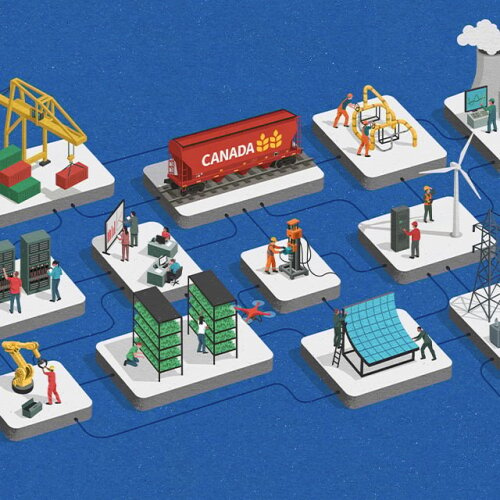Best Energy Regulatory Law Lawyers in Canada
Share your needs with us, get contacted by law firms.
Free. Takes 2 min.
Or refine your search by selecting a city:
List of the best lawyers in Canada
About Energy Regulatory Law in Canada
Energy Regulatory Law in Canada governs the production, transmission, distribution, and consumption of energy resources, including oil, natural gas, electricity, and renewable energy. This area of law is complex and multifaceted, involving federal, provincial, and territorial regulations. Key issues include licensing, environmental assessments, Indigenous rights, market operations, and compliance. The regulatory landscape is overseen by agencies such as the Canada Energy Regulator (CER) at the federal level, and various provincial bodies including the Alberta Utilities Commission (AUC) and the Ontario Energy Board (OEB). Energy Regulatory Law plays a vital role in ensuring the safe, fair, and environmentally responsible development of Canada’s natural resources.
Why You May Need a Lawyer
Individuals and organizations may need legal assistance with Energy Regulatory Law for a variety of reasons. Common situations include:
- Applying for permits or licenses to develop, construct, or operate energy projects.
- Navigating compliance with environmental and safety regulations.
- Participating in hearings or disputes before regulatory boards or tribunals.
- Addressing impacts on or collaboration with Indigenous communities and lands.
- Negotiating energy supply contracts or joint ventures.
- Responding to enforcement actions or inspections.
- Advising on mergers, acquisitions, or restructuring within the energy sector.
- Understanding rights and obligations under federal and provincial legislation.
- Managing land use, access, or property rights affected by energy infrastructure.
Given the evolving nature of energy policy and environmental expectations, legal advice can help avoid costly mistakes and ensure compliance.
Local Laws Overview
Canada’s energy regulatory framework is a patchwork of federal and provincial laws. The key federal legislation includes the Canadian Energy Regulator Act, the Impact Assessment Act, and various environmental protection laws. Federal authorities regulate projects that cross provincial or international borders, such as interprovincial pipelines and international power lines.
Provinces and territories have jurisdiction over most energy activities within their borders. For example:
- Alberta governs oil sands and energy utilities through its own acts and the Alberta Energy Regulator.
- Ontario regulates its electrical and natural gas markets under the Ontario Energy Board Act.
- British Columbia manages both conventional and renewable generation under the BC Utilities Commission.
Many projects, especially large-scale energy developments, require both provincial and federal approvals, and may also involve consultation with Indigenous communities due to constitutional rights and obligations. The regulatory process may include public participation, environmental assessments, and ongoing monitoring for safety and environmental protection.
Frequently Asked Questions
What is the role of the Canada Energy Regulator?
The Canada Energy Regulator (CER) oversees the construction, operation, and abandonment of pipelines, power lines, and energy exports that cross provincial or national boundaries. The CER ensures compliance with safety, environmental, and economic requirements.
Do I need federal or provincial approval for my energy project?
It depends on the project location and scope. Cross-border projects require federal approvals, while most in-province activities need provincial authorization. Some projects need both, especially if environmental impacts are significant.
How do Indigenous rights affect energy projects?
Governments and project proponents must consult and, when appropriate, accommodate Indigenous communities whose rights or lands may be impacted. This duty arises from constitutional protections and case law and can affect approval timelines and project design.
What are common environmental requirements for energy developments?
Projects typically require environmental assessments to evaluate potential impacts on air, water, wildlife, and communities. Mitigation measures, monitoring, and compliance reporting are often mandatory.
What happens if I fail to comply with energy regulations?
Non-compliance can result in fines, orders to cease operations, legal action, or revocation of permits. Proactive compliance and legal guidance are critical to avoiding penalties.
Can I participate in energy regulatory hearings?
Many hearings before regulators are open to interested parties, including landowners, community groups, and individuals. Participation may require formal registration and submissions.
Are energy rates regulated in Canada?
Yes, rates for electricity and natural gas distribution are regulated by provincial boards to ensure fairness and affordability for consumers.
How do mergers and acquisitions in the energy sector get approved?
Significant mergers and acquisitions may require approval from regulatory agencies to assess their impact on competition, market fairness, and consumer interests.
Can small-scale or individual renewable energy projects be connected to the grid?
Many provinces have programs for small-scale renewable energy generation, including net metering, allowing individuals and businesses to connect to the grid under regulated terms.
Where can I file a complaint about an energy company or utility?
Complaints can typically be filed with the relevant provincial regulator, such as the Ontario Energy Board or Alberta Utilities Commission, or the CER for federally regulated entities.
Additional Resources
Consider consulting the following organizations and resources for more information on Energy Regulatory Law in Canada:
- Canada Energy Regulator (CER)
- Provincial energy and utility boards, such as the Ontario Energy Board (OEB), Alberta Energy Regulator (AER), Alberta Utilities Commission (AUC), and British Columbia Utilities Commission (BCUC)
- Natural Resources Canada (NRCan)
- Canadian Environmental Assessment Agency
- Indigenous and Northern Affairs Canada (INAC)
- Canadian Bar Association - Energy and Environmental Law sections
- Legal clinics and professional legal directories specializing in energy law
Next Steps
If you require legal assistance with Energy Regulatory Law matters in Canada, consider taking the following actions:
- Identify the specific nature of your legal issue or regulatory concern.
- Reach out to a lawyer or law firm specializing in energy regulatory matters, particularly those with experience in your province or territory.
- Prepare all relevant documents and information related to your project or issue, such as regulatory filings, correspondence, permits, and notices.
- Contact the appropriate regulatory authority for guidance, if needed, or to obtain application forms and process information.
- Stay informed of legislative and policy changes affecting the energy sector, which may impact your rights and obligations.
- Consider seeking a legal opinion or consultation before launching any new project, responding to enforcement actions, or entering into significant contracts.
Consulting a legal professional early can help you navigate the complex regulatory environment, avoid common pitfalls, and protect your interests in the Canadian energy sector.
Lawzana helps you find the best lawyers and law firms in Canada through a curated and pre-screened list of qualified legal professionals. Our platform offers rankings and detailed profiles of attorneys and law firms, allowing you to compare based on practice areas, including Energy Regulatory Law, experience, and client feedback.
Each profile includes a description of the firm's areas of practice, client reviews, team members and partners, year of establishment, spoken languages, office locations, contact information, social media presence, and any published articles or resources. Most firms on our platform speak English and are experienced in both local and international legal matters.
Get a quote from top-rated law firms in Canada — quickly, securely, and without unnecessary hassle.
Disclaimer:
The information provided on this page is for general informational purposes only and does not constitute legal advice. While we strive to ensure the accuracy and relevance of the content, legal information may change over time, and interpretations of the law can vary. You should always consult with a qualified legal professional for advice specific to your situation.
We disclaim all liability for actions taken or not taken based on the content of this page. If you believe any information is incorrect or outdated, please contact us, and we will review and update it where appropriate.
Browse energy regulatory law law firms by city in Canada
Refine your search by selecting a city.














